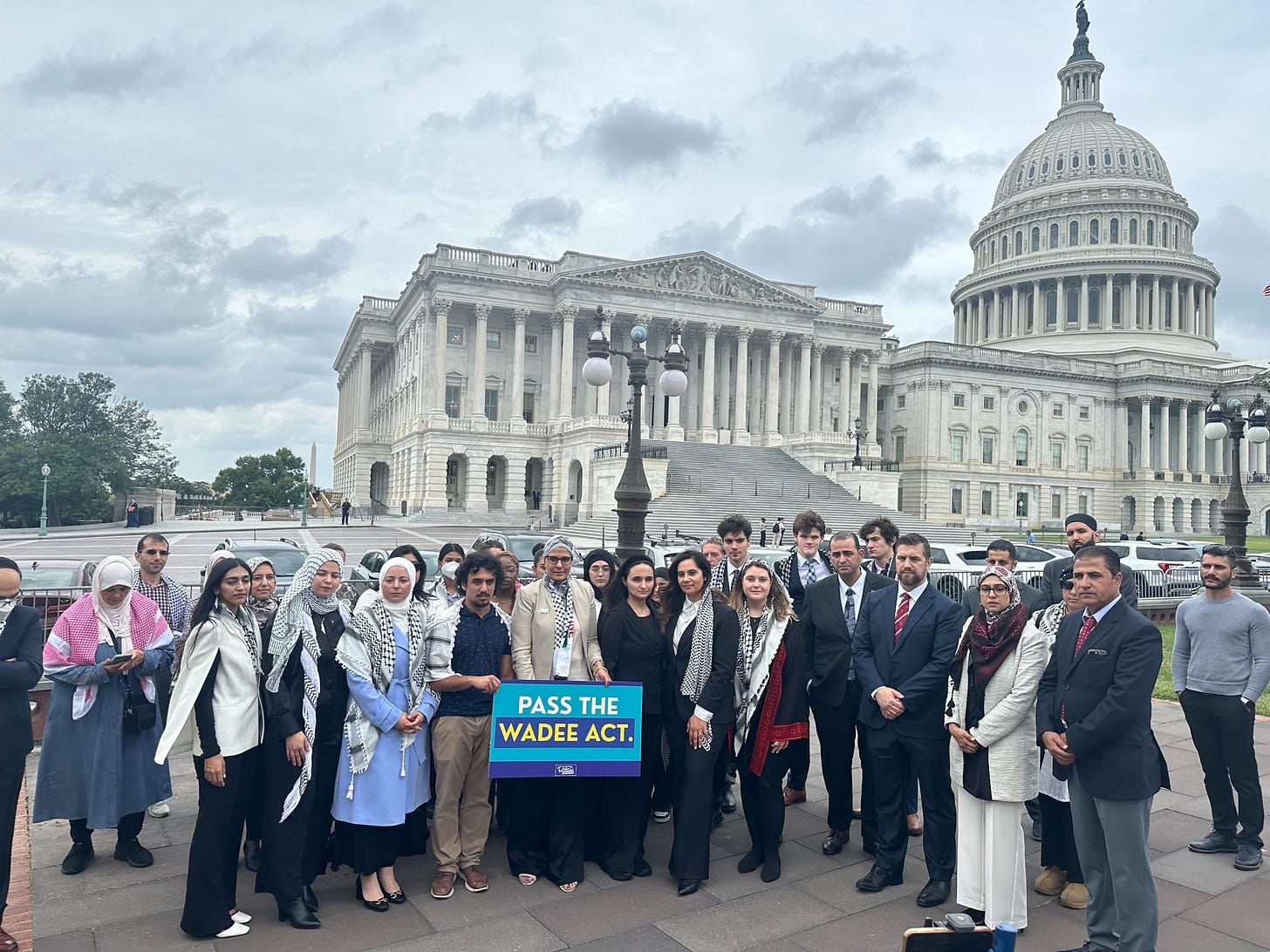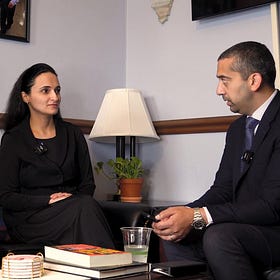Republican Senator Targets Only Muslim Witness at Hate Crimes Hearing
Prompted in part by the killing of a six-year-old Palestinian-American, the hearing ended up barely addressing Palestinians.

Lawmakers and people of varied backgrounds donning keffiyehs filed into the US Senate Judiciary Committee’s hearing room on Tuesday for Washington’s first official attempt to address anti-Palestinian and anti-Arab hate. But the hearing did everything but, with one Republican senator explicitly contributing to it.
Louisiana Sen. John Kennedy yelled at the only Muslim and Arab-American witness present — saying she supports Hamas, Hezbollah and Iran.
"You should hide your head in a bag,” the US elected official said menacingly toward Maya Berry, the executive director of the Arab American Institute and co-chair of the Hate Crimes Task Force for the Leadership Conference on Civil and Human Rights.
“You asking the executive director of the Arab American Institute that question very much puts the focus on the issue of hate in our country,” Berry responded when Kennedy first suggested she supports Hamas.
Senate Majority Leader Chuck Schumer’s office did not respond to questions about the incident and how the Senate might respond to Kennedy’s racist and incendiary remarks.
The hearing spurred by hate crimes, including the shooting of three Palestinian-Americans (one of whom is now paralyzed from the chest down) in Vermont and the murder of six-year-old Wadee Alfayoumi, a Palestinian-American boy who was stabbed 26 times at his home, in Illinois; his mother, Hanaan Shahin, was also stabbed, strangled, and left critically injured. Shahin sat in the audience on Tuesday.
The hearing — the first of its kind in this Congress to address hate directed against Arabs, Muslims or Palestinians after hearing upon hearing focused solely on antisemitism — was still concerned with all forms of hate, including antisemitism. Also in the audience was the Mallinger family, whose grand matriarch, Rose, was among the 11 killed in the Tree of Life synagogue shooting in 2018.
Senate Judiciary Committee Chairman Dick Durbin opened the hearing by sharing sympathy for both Wadee and his mother — who were attacked in Durbin’s home state of Illinois — as well as the Mallinger family.
“Political leaders, both Democrats and Republicans, must condemn hate, wherever and whenever it is spewed, and avoid rhetoric that could incite violence. Because hate is inconsistent with who we are as Americans and the diversity that has always strengthened our nation,” Durbin said, calling out antisemitic and racist language used by officials, including the Republican presidential ticket, citing dangers including the Tree of Life shooting, the 2022 white supremacist shooting in Buffalo and the threats against the Haitian community and the broader public of Springfield, Ohio.
Durbin’s attempts to set the tone of what could have been a unifying hearing was echoed by the witnesses, namely the two who Republicans spent most of their time attacking, rather than addressing with sincerity: Berry and Kenneth Stern, director of the Bard Center for the Study of Hate.
Berry went to great lengths in her testimony to advocate for unity and mutual care. “Because the safety of us all is linked, because we are on a very basic level all in one community with one another, hate crimes impact our entire country,” Berry told lawmakers. Ironically, before Kennedy’s racist remarks, Berry also warned about the dangers of elected officials, in particular, espousing hate.
When elected officials “target specific communities as the source of those problems, that’s where we find ourselves in the place that we are, which is that we see spikes in hate against specific communities,” she said. And indeed, some of the most vicious anti-Palestinian rhetoric from Republicans preceded attacks on both Alfayoumi and the three Vermont students.
Stern, meanwhile, focused particularly on links undergirding antisemitism and other forms of hate. He cited the 2019 mass shooting targeting Latinos in El Paso, noting how the shooter had a “nearly identical” ideology as the man who killed 11 people in 2018 at the Tree of Life synagogue, which was also targeted because of its support for immigrants, Stern noted.
In the face of such testimony, Republicans on the committee spent most of their time either haranguing the witnesses, diverting the hearing to focus solely on claims of antisemitism on college campuses, or falsely suggesting that the hearing was broadened to all forms of hate instead of focusing solely on antisemitism.
The former was particularly notable given that the hearing was in part spurred by the “Wadee Act,” a resolution first introduced last year in December by Rep. Delia Ramirez, and re-introduced in March in partnership with the Muslim Civic Coalition. The resolution, honoring Alfayoumi as a victim of a hate crime, affirms that no one should be a target of hate because of their ethnicity or religion; it declares that Palestinian children, Israeli children, American children and children worldwide “deserve to live in peace and be free from discrimination, hate crimes, and violence.”
The resolution states that no one — “whether they wear a hijab, keffiyeh, turban, mitpahat, tichel, shpitzel, sheitel, kippah, or yarmulke” — should be a target of hate.
And yet Republicans on the committee suggested that the hearing — “A Threat to Justice Everywhere: Stemming the Tide of Hate Crimes in America” — was insulting, and embodied an insufficient focus on antisemitism. The notion was notable, given ranking member Sen. Lindsey Graham’s own comments that the House has “had 10 hearings focused on antisemitism.”
Even then, while attending a hearing that dared mention Palestinian pain, not one of the Republicans spent significant time condemning violence against Palestinians or even acknowledging Shahin, who was in the audience and whose 6-year-old son was brutally murdered.

Democrats on the committee addressed all three witnesses and generally expressed some level of earnestness, though not directly challenging Republicans’ behavior or the targeting of American college students. When a threat was made against a Jewish community center in Minnesota, “the first message for them was from the neighboring Islamic center, who offered them a place to go,” Minnesota Sen. Amy Klobuchar recalled, prompting applause.
At another point, Vermont Sen. Peter Welch spoke of shared “obligation” in the face of hatred that is “so corrosive to all of us and to our society.”
“And if we as a society can’t accept the collective responsibility that we each have for the wellbeing of one another, then it's not going to work,” he added.
Republicans otherwise turned the Democratic-led committee hearing into a talking-point extravaganza. They only addressed Stern and Berry to interrogate them while Democrats spoke to all three witnesses; they used their time mainly to suggest Congress wasn’t doing enough to police college campuses, rather than address victims of anti-Palestinian and antisemitic hate, even those in the audience.
Seven senators were absent. Five Democrats (Sens. Chris Coons, Cory Booker, Alex Padilla, Jon Ossoff and Laphonza Butler) and two Republicans (Sens. Tom Cotton and Thom Tillis).
Padilla was presiding over the Senate during the hearing while Coons had a scheduling conflict, according to staff. None of the other senators responded to requests about their absence.
Some attendees complained that the absences — coupled with relative Democratic passivity in response to Republicans’ behavior — undermined the hearing and any hope for it to be genuinely productive.
“It’s always hard at a hearing where some members of Congress want to say their views and so forth,” Stern told me after the hearing, adding that whenever the hearing was focused on solutions, it was good. “I think the attack on Maya Berry by Senator Kennedy, I thought, was problematic. I think it was not helpful, but I think she was able to turn it around to demonstrate part of what the problem is.”
Abed Ayoub, national executive director of the American-Arab Anti-Discrimination Committee, told me as much. By the time Sen. Ted Cruz began delivering remarks, Ayoub decided to walk out of the hearing. The Texas Republican was spending most of his time calling to more heavily police college campuses, and did not engage with the witnesses other than to ask Rabbi Mark Goldfeder if the Biden administration has cut off funding to campuses or indicted student protestors.
“It was really a culmination of just each of the Republican speakers — and even some of the Democratic speakers who showed up — that just, ignoring his mom sitting right there,” Ayoub said, referring to Shahin. “I couldn’t take it — I just didn't feel right about it, and didn't want to be in that room. It wasn't just one particular thing, it was just the whole thing was hijacked by their own agenda and wanting to talk about college campuses.”
He wasn’t surprised by the Republicans’ behavior, he told me.
“What's surprising is the lack of participation from the Democratic side. You know, where are they? Where were their talking points? Where were their positions? They were kind of just haphazardly making their comments and leaving,” Ayoub said, noting that the Democratic absences led to Republicans in attendance asking back-to-back questions instead of alternating between parties. “So, they let the Republicans really control the hearing. And I think once they saw that there wasn't much coming from them, it was easy. I mean, it was easy for them to go one after another.”
—
Zeteo’s Mehdi Hasan spoke with Hanaan Shahin, on camera, after the hearing:
EXCLUSIVE: Mehdi Interviews the Mother of the Palestinian-American Child Stabbed to Death After Oct. 7th
On October 14, 2023, a week after the Hamas attacks on Israel, and just days after Joe Biden falsely claimed he had seen photos of beheaded Israeli babies, a 6-year-old Palestinian-American boy called Wadee Alfayoumi was brutally murdered in his home after being stabbed 26 times. His mother, Hanaan Shahin, was also stabbed and left critically injured.





it really is a microcosm of america . having a hearing on anti-muslim hate, with a panel of republicans giving out that very hate, and then them complaining about the lack of respect for israel and being more worried about anti-Semitism? its really just speaks for itself does it not? :(
Mr. John Kennedy's behaviour was just disgraceful. So disrespectful to the family, to all of the families who were there to try and stop exactly that sort of disgraceful rhetoric.
How can people vote for that sort of person? smh